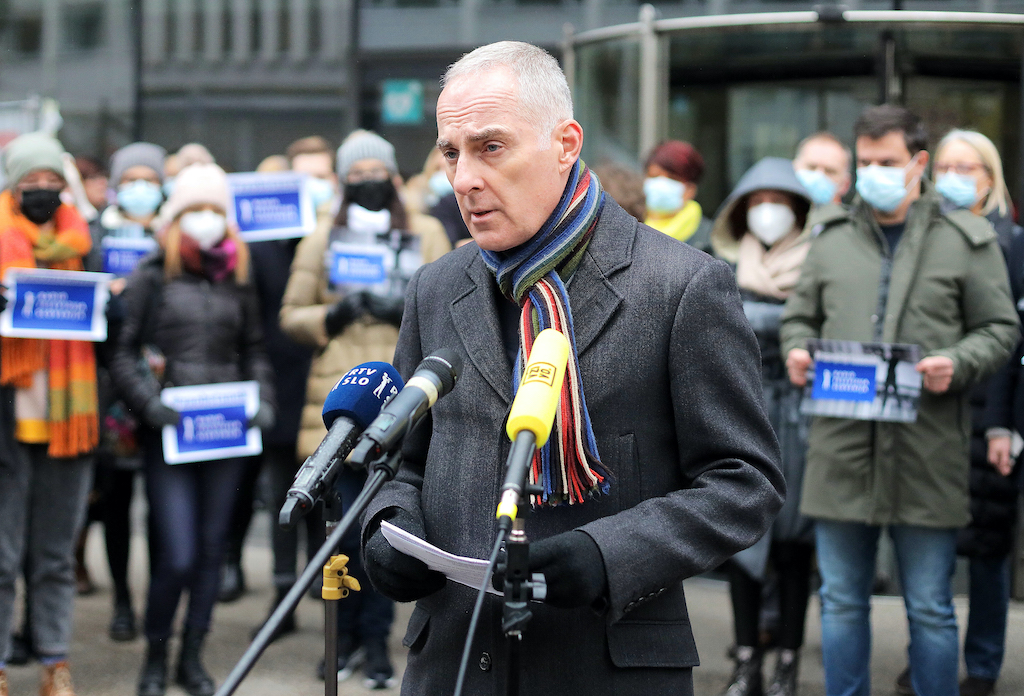In the middle of the week, the government appointed representatives of the Ministry of Culture and the Ministry of Public Administration to help the journalists’ union resolve disagreements between journalists and the management of RTVS. As the representatives of the founder of the public institution, the government appointed the state secretary at the Ministry of Culture, Marko Rusjan, Acting General Director of the Media Directorate, Dr Blaž Mazi, media consultant at the Ministry of Culture, Lenart J. Kučić, and secretary Nika Benedik from the Ministry of Public Administration.
We asked the director of TV Slovenija Uroš Urbanija whether it is legally and formally appropriate for public services, such as ministries, to get involved in the trade union affairs of an otherwise public institution and how he comments on this government decision.
“As the director of TV Slovenija, I am shocked by the government’s decision and I am afraid that with the next decree they will try to appoint even editors, and maybe even journalists, who could prepare articles about the government. It is apparently a new government attack on independent media and Prime Minister Robert Golob’s desire to take 100% control over public media. Unfortunately, these are ideas that are increasingly reminiscent of Putin’s abuse of the Russian media,” he answered for our online portal Demokracija.si.
Concerned as to whether the government has the authority to act in this way, we asked the director of TV Slovenija whether this is not a somewhat legally inappropriate decision from the government’s point of view. Urbanija assessed: “If the journalists’ union asked the government to represent them in the negotiations, we found ourselves in an extremely unusual situation and a great shame for journalists. Until recently, they boasted that their job was to control the authorities, that they were so-called guard dogs. Based on this decision, it seems that the authorities are the ones who control and protect individual journalists. But I am sure that the majority of journalists at RTV do not want the authorities to monitor and guard them.”
The government justifies that it appointed its representatives “in an effort to establish a dialogue and calm the situation at RTV Slovenia for an amicable resolution of the dispute regarding the strike demands of the journalists and other media workers at RTV” and that “by appointing representatives of the Ministry of Culture and the Ministry of Public Administration, the government exercises the rights and duties of the Republic of Slovenia as the founder of the public institution RTV Slovenia”.
Let us remind you how politically neutral the appointees are: State Secretary at the Ministry of Culture, Marko Rusjan is a lawyer from Šempeter pri Gorici who has worked in the cultural sphere for several years, and for the last two years he was an expert associate of the Levica parliamentary group in the National Assembly, and between 2018 and 2022 he was a city councillor of Levica in the Municipality of Nova Gorica. In the past, Dr Blaž Mazi was a journalist for the newspaper Dnevnik, then he moved to Radio Slovenia. Former journalist Lenart J. Kučič, who, among other things, in the past also investigated the (lack of) transparency of Mladina ownership and the media octopus of the left-wing tycoon Martin Odlazek, interestingly, after this investigation and finding violations of the media law, he suddenly found himself on the side of exactly these, who support this, and the chair was offered to him by the Minister of Culture Asta Vrečko herself. And Nika Benedik is known to the public as the former wife of Mladina editor Gregor Repovž.
L. K. F.


